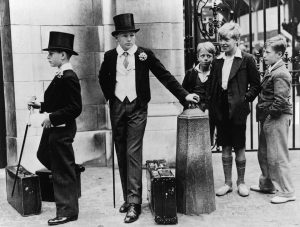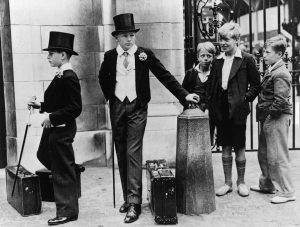The purpose of a pupil premium in the UK is to raise the academic achievement of ‘under privileged’ children, seeking to lift them out of their cycle of poverty and help to create a more equal society. The early signs are that the initiative is working, albeit slowly. Success is measured by comparing the achievement gap between those registered and the rest of the school population. That gap is closing in the primary sector but in the secondary sector the gap is proving harder to bridge. The likely reason for this discrepancy is that as pupils get older their sense of failure becomes more ingrained. Getting a teaching assistant to help them is tantamount to sticking a dunce’s hat on their head. The very act of trying to support them stigmatises them in the eyes of their peers.
There are those that think it is throwing good money after bad as the odds against these children succeeding are substantial. Children who exhibit significant behaviour problems mainly come from this cohort and as such provide a real challenge. Hence, the quality of support is vital if the pupil premium is going to be a success. Does that degree of expertise exist in enough numbers to meet the demand?
The project is being funded, on Jersey, to the tune of£850,000 per year. Just over two thousand pupils are eligible. Each primary child selected receives an extra £700 and £450 for secondary pupils. It would be churlish to criticise such philanthropy but whilst States members congratulate themselves on a vote winner they remain silent about that other piece of educational patronage; the eight million pounds that is allocated to the two thousand pupils that attend the rebranded ‘States Funded Private Schools’, an oxymoron with serious societal implications. It is TEN TIMES the amount apportioned to the pupil premium. The States also subsidise other Independent schools to the tune of £4 million, with the highest paid head teacher on the island, being in charge of one of these. And what of the majority of pupils that receive no extra financial support? Most islanders cannot afford to send their children to a S.F.P.S yet it is their taxes that subsidise them.
Every pupil is given an ‘assisted weight pupil unit’ or A.W.P.U. This is tallied up to decide school funding. For example the A.W.P.U for a child in a State Primary is around £3,500 and for a secondary school pupil is about £6,500. The A.W.P.U for a child from a S.F.P.S is around half that of a child in the states sector. However, when school fees and sponsorship are added the figure is far in excess of that in the States sector.
In the UK, Independent schools register themselves as a charity. By registering they save £522 million in taxes, revenue that could be used for the benefit of all children. The argument used by those that send their children to private schools for continuing the ‘subsidy’ is that they are paying twice. But it is a facile argument. If they want to pay extra, that is their choice and it brings with it exclusivity and privilege. Most parents do not have a choice.
For this taxpayer’s investment in private education what does the island get for their money that a state school could not offer? The number of pupils with Special Educational Needs and/or those with English as a second language are marginal (compared to a school like Haute Vallée that has 13% with S.E.N and 39% E.A.L. Haute Vallée also includes a unit for pupils with autism and integrates pupils from Mont a l’Abbé special school). State funded schools are supposed to promote inclusion and equality, the S.F.P.S are by their very nature exclusive.
To any outside observer, seeking to make efficiencies in our education system this would be a no brainer. £12 million would pay for free places for all Nursery children, cover the cost of the pupil premium, fund the Jersey Childcare Trust, provide a free music service for all pupils, under write a H.E student loan system and raise attainment across all schools. Supporters of S.F.P.S say that they are saving the States money by taking their children out of the state system but any school receiving funding from the States should embrace inclusion and equality of opportunity. Likewise, by continuing to provide capital, the States are openly shoring up societal inequality whilst purporting to advocate inclusion via the pupil premium, at a ratio of £10 to £1.
Whilst politicians pay homage to the pupil premium in the hope that some of its political fairy dust will come their way, to rage against the machine is to commit political suicide. The ghost of James Reid (the ex Education Minister that dared to propose cuts in funding for private schools) haunts the States Chamber as a warning to any that dare question the status quo and is testament that the lobby upholding S.F.P.S funding is potent. This institution is a window into the soul of the island. It is a pillar of the established order that maintains a glass ceiling way beyond a person’s formative years. Children learn much from their time at school and until the educational divide is removed the divisions in society on Jersey and in the UK, will remain.

